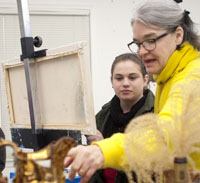Discover the Transformational Power of Giving

Laura Battle Winstead '50
The power of planned giving continues to make a positive impact on Randolph College and its students. One recent example occurred in late June 2016 when the College received the second largest gift in its 125-year history, a $7.8 million planned gift from the estate of Laura and Emerson Winstead Jr.
Laura Battle Winstead, a 1950 Randolph-Macon Woman's College graduate, and her husband Emerson Clarence Winstead Jr., were consistent, loyal supporters of the College. During their lifetime, the Winsteads were passionate about several different initiatives at the College, including the Annual Fund and student scholarships. The couple also chose to include the College in their estate plan and met with Randolph representatives to ensure their wishes were properly documented.
Randolph College remains honored and grateful that the Winsteads chose to trust the College with this transformational gift that will provide academic scholarships for hundreds of deserving students, a legacy that will live forever. What began as a simple gesture grew into something much more for both the Winsteads and the College.
Randolph College is forever grateful not only to the Winsteads, but to the many loyal alumnae, alumni and friends who support the College with a planned gift. Please do not hesitate to contact the Planned Giving Office at plannedgiving@randolphcollege.edu or 434-485-8050 if you would like to receive additional information or to discuss the establishment of a planned gift.

